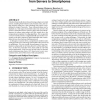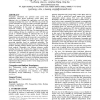7228 search results - page 42 / 1446 » From Algorithmic to Subjective Randomness |
105
click to vote
KDD
2008
ACM
15 years 10 months ago
2008
ACM
The input to an algorithm that learns a binary classifier normally consists of two sets of examples, where one set consists of positive examples of the concept to be learned, and ...
AIME
1997
Springer
15 years 1 months ago
1997
Springer
We used Machine Learning (ML) methods to learn the best decision rules to distinguish normal brain aging from the earliest stages of dementia using subsamples of 198 normal and 244...
MM
2010
ACM
14 years 10 months ago
2010
ACM
It has been theoretically shown that performing coding in networked systems, including Reed-Solomon codes, fountain codes, and random network coding, has a clear advantage with re...
WWW
2008
ACM
15 years 10 months ago
2008
ACM
Geographic information has spawned many novel Web applications where global positioning system (GPS) plays important roles in bridging the applications and end users. Learning kno...
101
click to vote
GECCO
2006
Springer
15 years 1 months ago
2006
Springer
Adaptive Random Testing subsumes a class of algorithms that detect the first failure with less test cases than Random Testing. The present paper shows that a "reference metho...


